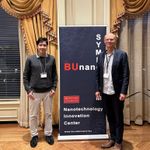Winners of 2023 Best Poster and Best Paper Awards
Winner of the Best Paper Award: Hagen Gress, Mechanical Engineering
 Hagen Gress is a 5th-year Ph.D. student working under Prof. Kamil Ekinci in the Nanometer Scale Engineering Lab. He has a background in Mechanical Engineering with a focus on micro- and nanofluidics. At BU, he has been studying the Brownian dynamics of nanoscale resonators immersed in viscous fluids. He is currently developing 3D-printed resonators which can function as versatile low-cost mass sensors. Hagen’s favorite thing about BU (aside from the magnificent view of the Charles River) is the collaboration between departments. As a former recipient of the BUnano Cross-disciplinary Fellowship, he had the opportunity to work with biomedical engineers and learned how to prepare cell cultures for drug susceptibility testing on a microfluidic platform. After graduating, Hagen hopes to apply his interdisciplinary skills as a research scientist in a biotech company.
Hagen Gress is a 5th-year Ph.D. student working under Prof. Kamil Ekinci in the Nanometer Scale Engineering Lab. He has a background in Mechanical Engineering with a focus on micro- and nanofluidics. At BU, he has been studying the Brownian dynamics of nanoscale resonators immersed in viscous fluids. He is currently developing 3D-printed resonators which can function as versatile low-cost mass sensors. Hagen’s favorite thing about BU (aside from the magnificent view of the Charles River) is the collaboration between departments. As a former recipient of the BUnano Cross-disciplinary Fellowship, he had the opportunity to work with biomedical engineers and learned how to prepare cell cultures for drug susceptibility testing on a microfluidic platform. After graduating, Hagen hopes to apply his interdisciplinary skills as a research scientist in a biotech company.
Winner of Best Poster Award: Paige Woods, Biomedical Engineering
 Paige Woods is a 3rd year PhD candidate in the Glial Engineering Lab run by Timothy O’Shea, PhD. Prior to starting graduate school at BU, she got her BS in biomedical engineering at the University of Connecticut and worked for several years in the Schmidt Lab studying proteoglycan-4 as a therapeutic and working on contractual research for Novartis. Her career aspirations are to enter the industry for translational research developing therapeutics for novel approaches to Parkinson’s disease (PD) and other neurodegenerative diseases. Paige has several family members who suffer from PD and she hopes to improve the quality of life for patients like them. Her current projects include the development of synthetic dendrimer nanoparticles that are formulated to target glia in a cell-specific manner, with the goal of delivering nucleic acid therapeutics to these glial cells to improve glial function and slow disease progression in PD. Her favorite thing about BU is the collaborative nature of research among her peers, interdisciplinary interactions with other labs, and being nestled in the city of Boston. In addition to supporting her project, the BUnano Interdisciplinary Fellowship program has introduced her to peers in a variety of fields and has broadened her understanding of nanotechnology and nanotech applications.
Paige Woods is a 3rd year PhD candidate in the Glial Engineering Lab run by Timothy O’Shea, PhD. Prior to starting graduate school at BU, she got her BS in biomedical engineering at the University of Connecticut and worked for several years in the Schmidt Lab studying proteoglycan-4 as a therapeutic and working on contractual research for Novartis. Her career aspirations are to enter the industry for translational research developing therapeutics for novel approaches to Parkinson’s disease (PD) and other neurodegenerative diseases. Paige has several family members who suffer from PD and she hopes to improve the quality of life for patients like them. Her current projects include the development of synthetic dendrimer nanoparticles that are formulated to target glia in a cell-specific manner, with the goal of delivering nucleic acid therapeutics to these glial cells to improve glial function and slow disease progression in PD. Her favorite thing about BU is the collaborative nature of research among her peers, interdisciplinary interactions with other labs, and being nestled in the city of Boston. In addition to supporting her project, the BUnano Interdisciplinary Fellowship program has introduced her to peers in a variety of fields and has broadened her understanding of nanotechnology and nanotech applications.